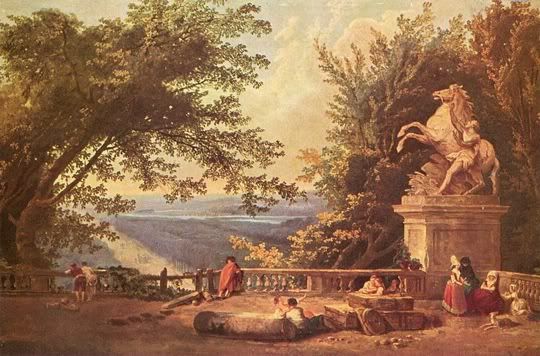The Combray routines are so intricate as to have regular variations that become part of a "uniform pattern upon the great uniformity of [Léonie's] life." (p.153). Saturdays are an example of this because, being a market day, lunch is served an hour earlier. The family is dependent upon the routine which is not just lived, but greeted and discussed like an active presence in their lives, and even has the ability to seemingly alter time:
"The very face of the sky appeared to undergo a change. After lunch the sun, conscious that it was Saturday, would blaze an hour longer in the zenith, and when someone, thinking that we were late in starting for our walk, said, 'What, only two o'clock!' on registering the passage of the twin strokes from the steeple of Saint-Hilaire...the whole family would respond in chorus: 'Why, you're forgetting we had lunch an hour earlier; you know very well it's Saturday.'" (p.154)The Saturday change in routine has the effect of uniting the family against outsiders who know nothing of it. They refer to outsiders as "barbarians," speak to them with ridicule, make fun of them between themselves. This gives the characteristics of a group mentality, like a clique.
But there's a softer side of habit that makes it attractive. M defines this for us, humanizing it further, upon returning home from a long walk with his family:
"And from that instant I did not have to take another step; the ground moved forward under my feet in that garden where for so long my actions had ceased to require any control, or even attention, from my will. Habit had come to take me in her arms and carry me all the way up to my bed like a little child." (p.160)And still it is as though Léonie wishes to be rid of her need for habit. Every week she longs for the variety that Saturday brings, and even more than that M implies that she has "exceptional moments when one thirsts for something other than what is" (p.161) even though she does not have the energy to bring it about. She is a slave to her habits. In fact, it is her habit of illness that is weakening her:
"And I have no doubt that then...she would extract from the accumulation of these monotonous days which she treasured so much a keen expectation of some domestic cataclysm, momentary in its duration but violent enough to compel her to put into effect, once for all, one of those changes which she knew would be beneficial to her health but to which she could never make up her mind without some such stimulus." (p.161)
Hawthorns. MP falls in love with them at the Month of Mary (May) devotions, when they are used to decorate the church. This, and their white color, gives them almost a holy meaning, but MP also recognizes their origin in nature:
"I could sense that this formal scheme was composed of living things, and that it was Nature herself who, by trimming the shape of the foliage, and by adding the crowning ornament of those snowy buds, had made the decorations worthy of what was at once a public rejoicing and a solemn mystery." (p.156)And also sees in them "a swift and thoughtless movement of the head, with a provocative glance from her contracted pupils, by a young girl in white, insouciant and vivacious."
(p.156) a vision that, having read the volume once, I can say is foreshadowing of another young girl amongst the hawthorns.
M. Venteuil and daughter at church. M. Vinteuil is a piano teacher whose wife is now dead. He will not socialize with Swann because of Swann's "most unsuitable marriage" (p.156). His daughter is described as "boyish" and "robust" with a "mannish face" (p.156-157)
On their way home MP's father takes them on a detour. MP's mother has no sense of direction and relies entirely on his father to get them home. We have seen this before, her deference to his "superior mind" (on p.12).
On their walk M compares the gardens to the art of Hubert Robert (p.159). Perhaps I should have labeled this art and nature, but I'll file it under art in life.
And I see that Léonie is fueling the fire between Françoise and Eulalie by feeding each of them false fears about the other, which in turn goes to convince even her of Françoise's unfaithfulness. Although it would seem that it is all untrue, and that Léonie as a character is just full of a morbid quality that makes her imagine the death of her family so that she can morn them, and makes her imagine infidelity in her servants so that she can be cruel to them.
Cool stuff:
Hawthorn in flower (photo by David Hawgood on Geograph)

Hubert Robert (p.159) was an 18th century French artist. He painted "fashionably dilapidated gardens" for clients.

